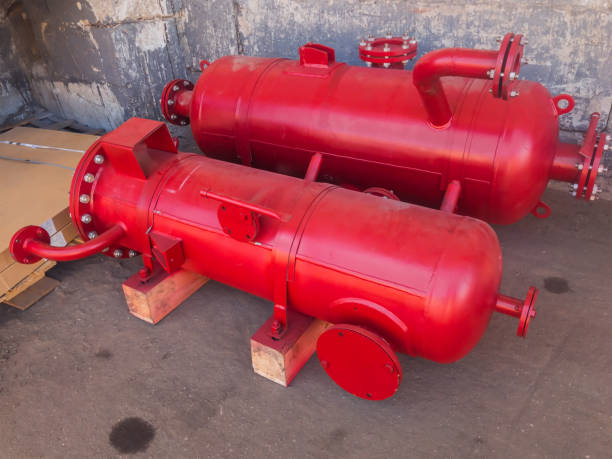No More Mistakes with Flour Mill Machine Manufacturer
Mar 11 2023

Air management is essential in HVAC and hydronic systems. One component that often goes unnoticed but plays a critical role in system efficiency is the air separator. In Dubai, where large-scale commercial and residential buildings rely heavily on climate control, air separators are key to maintaining system performance and reliability.
If you're exploring air separators suppliers in Dubai, understanding the types of air separators available—and their uses—can help you make informed decisions. This guide explains the different air separator types offered in the UAE market and their role in improving building systems.
Air separators are mechanical devices used in closed-loop heating and cooling systems. Their primary function is to remove entrained air and microbubbles from water circulating through the system. Trapped air can reduce heat transfer, cause noise, increase energy consumption, and even damage equipment like pumps and boilers.
By installing air separators, system designers ensure smoother operation, lower maintenance needs, and longer equipment life.
The UAE has a hot climate, and HVAC systems are under continuous load, especially in cities like Dubai and Abu Dhabi. Proper air elimination:
Improves system circulation
Enhances cooling or heating efficiency
Prevents cavitation and corrosion
Extends the life of chillers, pumps, and pipes
Due to the scale of developments in Dubai—from towers and malls to data centers and hospitals—air separators have become a standard component in HVAC and hydronic systems.
Suppliers in Dubai offer a wide range of air separators, each designed for specific flow rates, system sizes, and operating pressures. Below are the most common types:
These are the most basic type and are installed directly into the pipeline. In-line air separators use a simple chamber design where flow slows down, allowing air bubbles to rise and be vented out.
Small to medium-sized HVAC systems
Straight-line piping layouts
Cost-effective installations
Easy to install
Compact design
Minimal maintenance
These use centrifugal force to separate air from water. As water enters the chamber tangentially, it spins, forcing heavier water outward and lighter air inward, where it rises and is removed.
Large HVAC systems
High-efficiency applications
District cooling plants in the UAE
High air removal efficiency
Handles large flow volumes
Effective for microbubble removal
These include internal media that help tiny air bubbles merge (coalesce) into larger ones, making removal easier. The media often consists of mesh, screens, or baffles that slow down flow and promote air release.
Hydronic heating and cooling systems
Industrial applications
Complex piping systems
Removes dissolved and micro air
Works well with glycol-based systems
Improves overall fluid quality
Suppliers in Dubai also offer units that combine air and dirt separation in a single device. These dual-function separators remove both air bubbles and solid particles (like rust, scale, or debris) from circulating fluid.
Chiller systems
Centralized cooling systems
Industrial plants
Saves space and installation costs
Reduces the need for additional filters
Improves system hygiene and efficiency
These advanced units use vacuum technology to extract dissolved gases from water. Unlike passive separators, vacuum degassers actively reduce air content to very low levels.
Precision-controlled HVAC systems
High-rise buildings in Dubai
Data centers and laboratories
Removes both free and dissolved gases
Ideal for critical applications
Maintains system pressure and chemistry
When sourcing air separators from suppliers in Dubai, it’s essential to choose the right type based on your system’s requirements. Here are key factors to consider:
Choose a separator that matches the system’s flow capacity. Oversized or undersized units reduce effectiveness.
Ensure the separator is rated for the system's pressure and thermal load—important in Dubai's high-temperature environment.
Glycol-based systems, common in district cooling, require compatible materials and seals.
Some separators are better for vertical piping, while others suit horizontal or looped configurations.
Consider the ease of service, especially in commercial or industrial facilities.
Air separators supplied in Dubai typically conform to international standards such as:
ASHRAE guidelines
EN 12828 for heating systems
ISO 9001-certified manufacturing
Dubai Municipality or DEWA compliance for some public sector projects
Always verify documentation with the supplier or installer before purchase.
Most air separator suppliers in Dubai operate through:
HVAC equipment distributors
MEP contractors
Building automation companies
Online industrial marketplaces
Free zone-based importers and traders
Many suppliers offer consultation, technical support, and delivery across all Emirates. Whether for a villa, hotel, or tower, professional support ensures the right fit for the system.
Air separators are critical for maintaining the efficiency and reliability of heating and cooling systems in the UAE. Whether it's a chilled water system in a Dubai skyscraper or a district cooling plant, the right air separator ensures optimal performance.
Dubai’s suppliers offer a wide range of options—from in-line and centrifugal models to coalescing and vacuum-based units. Understanding their types, applications, and technical requirements helps project managers, MEP engineers, and facility managers make smart choices.
In a climate where cooling systems are essential year-round, investing in the right air separator is not optional—it’s a necessity for long-term system health.
Social Media Marketing Strategies for Beginners
Mar 14 2023
(0) Comments